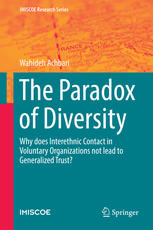

Most ebook files are in PDF format, so you can easily read them using various software such as Foxit Reader or directly on the Google Chrome browser.
Some ebook files are released by publishers in other formats such as .awz, .mobi, .epub, .fb2, etc. You may need to install specific software to read these formats on mobile/PC, such as Calibre.
Please read the tutorial at this link: https://ebookbell.com/faq
We offer FREE conversion to the popular formats you request; however, this may take some time. Therefore, right after payment, please email us, and we will try to provide the service as quickly as possible.
For some exceptional file formats or broken links (if any), please refrain from opening any disputes. Instead, email us first, and we will try to assist within a maximum of 6 hours.
EbookBell Team

5.0
68 reviewsThis book is about ethnic diversity in voluntary organizations and seeks to explain whether intergroup contact contributes to the development of generalized trust. It relies on a novel multilevel design and data from Amsterdam in which 40 voluntary organizations and 463 participants have been sampled. Contrary to conventional wisdom, this book argues that cognitive processes are contributing more toward the evaluation of strangers or generalized trust than interethnic contact. Since trusting unknown people is essentially a risky endeavor, this suggests that participants of both association types who report trusting strangers can afford to do so, because they are better educated, have a more positive worldview, and have had fewer negative life experiences. That is to say, they are socially more successful and view their future as more promising. Previous findings are inconclusive since most studies that conclude diversity has led to less generalized trust do not include interethnic contact directly in their analyses. These studies also downplay the importance of cognitive processes, which may shape generalized trust. What is more, people join ethnically diverse civic groups, because they already have more trustful attitudes, rather than learning to trust through interethnic contact. Despite the recent multiculturalist backlash, this book demonstrates that participation in ethno-national organizations does not pose a threat to social cohesion. The analysis in this book serves to build a general theory of trust that moves beyond emphasizing interaction between people who are different from each other, but one that includes the importance of cognition.